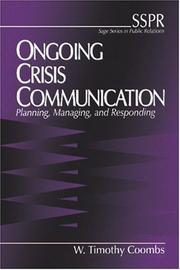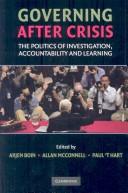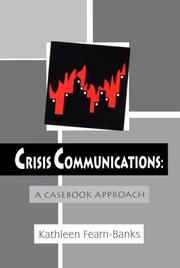| Listing 1 - 10 of 167 | << page >> |
Sort by
|

ISBN: 0415315204 0415315212 020356328X 9780415315203 9780415315210 9780203563281 Year: 2006 Publisher: London Routledge
Abstract | Keywords | Export | Availability | Bookmark
 Loading...
Loading...Choose an application
- Reference Manager
- EndNote
- RefWorks (Direct export to RefWorks)
One of the first books of its kind in the subject area, this text brings together the seminal papers in the area of crisis management and organizational theory along with the analysis of the leading names of the field. Covering the subject area from both a theoretical and practical perspective, it features chapters by Karl Weick, Charles Perrow and many other luminaries of the field. Divided into 4 main sections, the book considers crisis management from a theoretical, systematic and practical perspective it also looks at the approaches and limitations of crisis management processes and its cultural and psychological dynamics. Featuring expert editorial commentary of all the key readings, this is an essential text that provides proper definitions and explications of the areas within Crisis Management. An invaluable introduction for students.
Organization theory --- Crisis management. --- Crisis management
Book
ISBN: 178756617X 1787566153 1787566188 1787566161 9781787566156 9781787566187 9781787566170 Year: 2019 Publisher: Bingley Emerald Publishing
Abstract | Keywords | Export | Availability | Bookmark
 Loading...
Loading...Choose an application
- Reference Manager
- EndNote
- RefWorks (Direct export to RefWorks)
Can you control a crisis? No but with adequate preparation you can control the reputational consequences. Reputational damage is rarely caused by the crisis itself but, instead, by what the organisation does and says under the media spotlight.This PRCA Practice Guide describes how to invest in readiness and what to do when a crisis strikes. Coverage includes contingency planning, stakeholder identification, crisis communications policy, spokesperson training, the 'Red Book', dark sites, rehearsals and simulations, locations and resources, taking the initiative, and managing the aftermath. The book also covers in detail the role of the mainstream and online media, recommending steps to neutralise hostility and shut down ill-informed comment.Including numerous real-life examples, discussion topics and advice from PR experts, journalists and editors, Crisis Communications Management is intended as an essential guide for public relations professionals, and the people who work with them during a crisis, on how to navigate the turmoil and emerge from a crisis with reputation and credibility intact.
Book
ISBN: 9781107118461 1107118468 9781107544253 1107544254 9781316339756 1316849562 1316339750 1316848728 Year: 2017 Publisher: Cambridge Cambridge University Press
Abstract | Keywords | Export | Availability | Bookmark
 Loading...
Loading...Choose an application
- Reference Manager
- EndNote
- RefWorks (Direct export to RefWorks)
Crisis management has become a defining feature of contemporary governance. In times of crisis, communities and members of organizations expect their leaders to minimize the impact, while critics and bureaucratic competitors make use of social media to blame incumbent rulers and their policies. In this extreme environment, policymakers must somehow establish a sense of normality, and foster collective learning from the crisis experience. In the new edition of this uniquely comprehensive analysis, the authors examine how strategic leaders deal with the challenges they face, the political risks and opportunities they encounter, the pitfalls they must avoid, and the paths towards reform they may pursue. The book is grounded in decades of collaborative, cross-national and multidisciplinary case study research and has been updated to include new insights and examples from the last decade. This is an original and important contribution from experts in public policy and international security.

ISBN: 0761913203 Year: 1999 Publisher: Thousand Oaks, Calif. Sage
Abstract | Keywords | Export | Availability | Bookmark
 Loading...
Loading...Choose an application
- Reference Manager
- EndNote
- RefWorks (Direct export to RefWorks)
Organization theory --- Mass communications --- Communication in management. --- Crisis management.
Book
ISBN: 0190667702 0197656536 019061062X 9780190667702 9780197656532 9780190610623 9780190872083 Year: 2022 Publisher: New York, N.Y. Oxford University Press
Abstract | Keywords | Export | Availability | Bookmark
 Loading...
Loading...Choose an application
- Reference Manager
- EndNote
- RefWorks (Direct export to RefWorks)
"Contemporary societies are increasingly crisis-prone and crises have profound implications for the rapidly changing political, economic, and social landscape. Crises pose major challenges to governments, communities, leaders and organizations. The Oxford Encyclopedia of Crisis Analysis provides a comprehensive overview of the rapidly emerging and evolving field of crisis studies and explores its connection to a number of relevant neighboring fields of knowledge. Crises are complex, unfold in diverse political and socio-technical contexts and must be studied and understood from multiple angles and disciplinary perspectives. This Encyclopedia brings together contributions by experts from political science, public administration, management, international relations, public health, sociology, economics, media and mass communications, the law and many other fields to explore important theoretical, methodological, empirical, and practical issues related to crisis and crisis management. Articles focus on concepts (crisis as well as closely related concepts such as emergency, disaster, resilience, security etc.), contingencies (natural hazards, major accidents, pandemics, terrorism, social and political conflict among many others), historical and contemporary cases, classic and cutting edge research methods, different "phases" of the crisis/emergency management cycle, as well as documenting a wide range pitfalls and good practices that can help to forewarn and forearm current and future crisis managers"--

ISBN: 9780521712446 9780521885294 9780511756122 9780511388392 051138839X 0511387407 9780511387401 0511756127 9780511386398 0511386397 0521885299 0521712440 1107186498 1281255106 9786611255107 0511382731 0511384564 Year: 2008 Publisher: Cambridge Cambridge University Press
Abstract | Keywords | Export | Availability | Bookmark
 Loading...
Loading...Choose an application
- Reference Manager
- EndNote
- RefWorks (Direct export to RefWorks)
The constant threat of crises such as disasters, riots and terrorist attacks poses a frightening challenge to Western societies and governments. While the causes and dynamics of these events have been widely studied, we know little about what happens following their containment and the restoration of stability. This volume explores 'post-crisis politics,' examining how crises give birth to longer term dynamic processes of accountability and learning which are characterised by official investigations, blame games, political manoeuvring, media scrutiny and crisis exploitation. Drawing from a wide range of contemporary crises, including Hurricane Katrina, 9/11, the Madrid train bombings, the Walkerton water contamination, Space Shuttles Challenger and Columbia and the Boxing Day Asian tsunami, this is a ground-breaking volume which addresses the longer term impact of crisis-induced politics. Competing pressures for stability and change mean that policies, institutions and leaders may occasionally be uprooted, but often survive largely intact.
Internal politics --- Crisis management in government. --- Political leadership. --- Leadership --- Government crisis management --- Public administration --- Social Sciences --- Political Science
Book
ISBN: 9060007204 Year: 1990 Publisher: Arnhem Gouda Quint
Abstract | Keywords | Export | Availability | Bookmark
 Loading...
Loading...Choose an application
- Reference Manager
- EndNote
- RefWorks (Direct export to RefWorks)
Sociology of policy --- Crisis management --- -Crisis management in government --- Crisis management in government --- -Decision making --- Deciding --- Decision (Psychology) --- Decision analysis --- Decision processes --- Making decisions --- Management --- Management decisions --- Choice (Psychology) --- Problem solving --- Government crisis management --- Public administration --- Crises --- Management of crises --- Conflict management --- Decision making --- Crisis management in government. --- Crisis management. --- Decision making.

ISBN: 0805819223 0805819215 9780805819229 Year: 1996 Publisher: Mahwah, N.J. Erlbaum
Abstract | Keywords | Export | Availability | Bookmark
 Loading...
Loading...Choose an application
- Reference Manager
- EndNote
- RefWorks (Direct export to RefWorks)
Mass communications --- Public relations --- Crisis management --- Advertising --- Relations publiques --- Gestion de crise --- Publicité --- Management --- Case studies. --- Gestion --- Cas, Etudes de --- Publicité --- Communication in crisis management --- Communication --- Public relations - Management - Case studies --- Crisis management - Case studies --- Advertising - Case studies
Book
ISBN: 9781444361902 9781405194419 1405194413 1444361902 Year: 2010 Publisher: Chichester Wiley-Blackwell
Abstract | Keywords | Export | Availability | Bookmark
 Loading...
Loading...Choose an application
- Reference Manager
- EndNote
- RefWorks (Direct export to RefWorks)
Written as a tool for both researchers and communication managers, the Handbook of Crisis Communication is a comprehensive examination of the latest research, methods, and critical issues in crisis communication. * Includes in-depth analyses of well-known case studies in crisis communication, from terrorist attacks to Hurricane Katrina* Explores the key emerging areas of new technology and global crisis communication* Provides a starting point for developing crisis communication as a distinctive field research rather than as a sub-discipline of public relations or corporate communication
Crisis management. --- Communication in management. --- Gestion de crise --- Communication en gestion --- Crisis management --- Communication in management --- Organization theory --- Mass communications --- Communication in crisis management --- Communication dans les organisations --- Crises économiques --- Et les médias --- Crises économiques --- Et les médias
Book
ISBN: 9780241003398 9780241003435 0241003431 0241003393 0141977795 Year: 2019 Publisher: London Allen Lane, an imprint of Penguin Books
Abstract | Keywords | Export | Availability | Bookmark
 Loading...
Loading...Choose an application
- Reference Manager
- EndNote
- RefWorks (Direct export to RefWorks)
In his international bestsellers Guns, Germs and Steel and Collapse, Jared Diamond transformed our understanding of what makes civilizations rise and fall. Now, in his third book in this monumental trilogy, he reveals how successful nations recover from crises while adopting selective changes -- a coping mechanism more commonly associated with individuals recovering from personal crises. Diamond compares how six countries have survived recent upheavals -- ranging from the forced opening of Japan by U.S. Commodore Perry's fleet, to the Soviet Union's attack on Finland, to a murderous coup or countercoup in Chile and Indonesia, to the transformations of Germany and Austria after World War Two. Because Diamond has lived and spoken the language in five of these six countries, he can present gut-wrenching histories experienced firsthand. These nations coped, to varying degrees, through mechanisms such as acknowledgment of responsibility, painfully honest self-appraisal, and learning from models of other nations. Looking to the future, Diamond examines whether the United States, Japan, and the whole world are successfully coping with the grave crises they currently face. Can we learn from lessons of the past? Adding a psychological dimension to the in-depth history, geography, biology, and anthropology that mark all of Diamond's books, Upheaval reveals factors influencing how both whole nations and individual people can respond to big challenges. The result is a book epic in scope, but also his most personal book yet.
Civilisation --- Social change --- Political sociology --- International relations. Foreign policy --- Social history --- Crisis management --- 92 |x Geschiedenis. |y Histoire. |z History --- SOCIAL HISTORY --- SOCIAL CHANGE --- CRISIS MANAGEMENT --- Social history - Case studies --- Social change - Case studies --- Crisis management - Case studies
| Listing 1 - 10 of 167 | << page >> |
Sort by
|

 Search
Search Feedback
Feedback About UniCat
About UniCat  Help
Help News
News